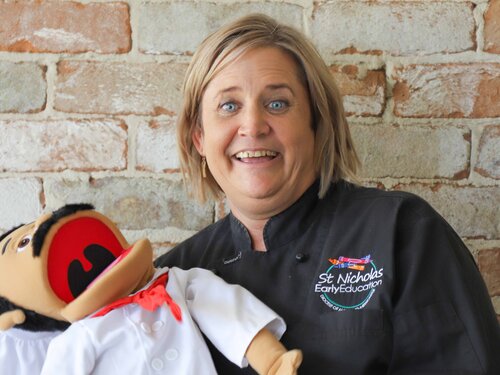Play based food experiences can switch children on to a lifetime of healthy eating

Renowned restaurateur and food writer, and founder of the Stephanie Alexander Kitchen Garden Foundation, Stephanie Alexander, has shared an opinion piece with The Canberra Times outlining the way in which play-based food experiences “help grow healthy children.”
“So much social learning happens around the table,” Ms Alexander said, “and from an early age children soon learn that food has power.”
Through food and mealtimes, children learn and practice skills in communication, compromise, trial and error, and food literacy, all of which take time to develop.
While the old refrain of “don’t play with your food” is memorable for many adults, Ms Alexander said that exploring, discovering and playing with food can be a joyful experience.
“We have all observed the delight that children as young as two get from modelling adult behaviour – who doesn’t remember a favourite tea-set, or a rolling pin, or a small watering can and garden tools?” she said, recalling making mud pies in the back garden with some friends, a lifelong memory built on play-based learning.
As well as imaginary experiences like making mud pies, children should also be encouraged to engage in real and meaningful food related activities such as pouring water, or adding mint to it to give a new flavour.
The experience of sharing a bounty which they have helped to create is also a powerful one for children, teaching them to be proud of their efforts, and reminding them of the value of sharing when one has more than one needs.
Learning from adults, either with deliberate teaching or by watching adults participate in certain activities can also be a powerful point of connection to the cycles and rhythms of food.
“I did a lot of cooking as a young child, and my mother was always happy to show me or allow me to help,” Ms Alexander said.
“She encouraged me to try a pea from the pod freshly picked from the garden.”
“I also followed my grandfather around as he dug potatoes and realised for the first time that potatoes have to be dug from the dirt. I imagine I probably said very little but nonetheless I was absorbing that physical effort was required to produce food.”
That the Foundation is now able to support the early years is a delight for her, Ms Alexander explained, sharing her observations from her visits to three pilot early years centres.
“I have been taken by the hand to look at the native bee hotel, to inspect the worm farm and the compost heap, and shared the excitement of parting leaves to locate a bright-red strawberry.”
“I looked on in astonishment as four-year-olds helped themselves (using regular tongs) from a big bowl of green salad, and others spooned filling into dumpling skins before they were steamed.”
“There was such excitement and generosity from the children at the lunch table.”
“It’s the kind of play that helps form who we are and I’m so proud my kitchen garden program has and will continue to contribute to this fun, hands-on learning in the early years,” she said in closing.
To access the original coverage of this story, please see here.
Popular

Quality
Practice
Provider
Research
Workforce
Honouring the quiet magic of early childhood
2025-07-11 09:15:00
by Fiona Alston

Practice
Provider
Quality
Research
Workforce
New activity booklet supports everyday conversations to keep children safe
2025-07-10 09:00:16
by Fiona Alston

Quality
Practice
Provider
Workforce
Reclaiming Joy: Why connection, curiosity and care still matter in early childhood education
2025-07-09 10:00:07
by Fiona Alston













